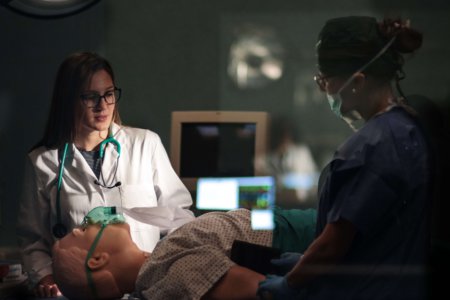Francesco Farina from Italy has long dreamed of becoming a surgeon. But alongside his medical ambitions, he maintained a deep interest in technology. His path took an exciting turn when he discovered the MEDTEC School at Humanitas University, which blends medicine and biomedical engineering. “I started MEDTEC in September 2020,” says Farina. “Now, I’m thinking about working not just as a surgeon but also collaborating with healthcare companies to develop new tools and technologies to improve patient care.”
MEDTEC is a one-of-a-kind school, the first in Europe to offer a double degree in Medicine and Surgery and Biomedical Engineering. Run by Humanitas University, in partnership with Politecnico di Milano, its rigorous six-year programme is taught entirely in English. When students graduate, they hold an MD and a Bachelor’s in Biomedical Engineering. This unique combination of skills prepares them for roles that bridge innovation and clinical practice.
For the latter, insights are predominantly drawn from Humanitas University, which is accredited by medical councils in countries including the UK, Ireland, the US, Canada, and Australia. In a milestone achievement, the university entered the Times Higher Education (THE) World University Rankings, ranking among the top 250 global universities. It’s little wonder why, considering the university is recognised by the World Health Organisation and listed in the World Directory of Medical Schools.
Prestige aside, Humanitas takes pride in offering tomorrow’s healthcare heroes a personalised experience. “The ‘smallness’ of our programme is a great asset,” says Farina. “Thanks to this, we’re able to build relationships with our tutors and professors and create or participate in various activities. Here, right from the first year, you can attend wards, research labs and much more.”

The MEDTEC programme equips students with skills in precision and regenerative medicine, as well as in addressing complex issues in technology and data analytics in healthcare. Source: Humanitas University
These connections have enriched his education, opening doors to practical experiences rare for students at such an early stage. For instance, Farina recalls attending an ophthalmology ward thanks to a professor’s invitation and spending a month in a US research lab focused on artificial retinal implants — a highlight that broadened his outlook on medical technology.
Indeed, the MEDTEC curriculum offers students a comprehensive view of healthcare’s technological advancements. This integration becomes especially evident in courses like Advanced Imaging and Diagnostics, where students delve into medical image interpretation and the engineering behind imaging technologies. In the haematology course, Farina and his peers explored how AI might enhance future diagnostic capabilities. “The integration between engineering and medical modules gives us a unique flexibility and the ability to embrace new future challenges,” he shares.
Humanitas and Politecnico’s collaboration fuels this combination. Alternating semesters on both campuses during the initial three years ensures balanced exposure to both fields. In the final years, engineering professors come to Humanitas, bringing the engineering perspective right into the clinical setting.

Humanitas University and Politecnico di Milano encourage interactive learning through research-based methods, problem-solving, case studies, and skill-based portfolios. Source: Humanitas University
Upon completing the programme, graduates boast expertise in advanced medical technologies, designing personalised therapies, and optimising outcomes using data analytics, machine learning, and devices like surgical robots, bio-printers, and 3D printing.
This breadth is made possible by the exposure they received as students. From hospital wards and operating rooms to research facilities, learners are actively involved in the practical side of medicine from the outset of their studies. Those more inclined towards engineering are encouraged to utilise Politecnico di Milano’s facilities and attend the many masterclasses hosted on-campus by top biotech companies.
“Given the high degree of interdisciplinarity of the course, my lateral thinking was significantly enhanced by the MEDTEC programme,” shares Farina. “And given the programme’s intensity, I developed incredible organisational skills that also allowed me to keep up with sports and volunteering.”
This holistic approach explains why MEDTEC graduates are well-positioned for diverse career opportunities. They can pursue specialisations in any medical field through speciality or residency schools or immediately add value as professionals in the pharmaceutical or biotechnology sectors.
Farina hopes to work in the surgical world, focusing on technologies and innovative approaches. He’s equally intrigued by the idea of making a name for himself in the biomedical field. “The beauty of our path is that it prepared us to face both the surgical world and the fascinating world of biomedical companies,” he enthuses. “I feel ready to embark on new challenges!”
Follow Humanitas University on Facebook, Instagram and LinkedIn













